Comodo Dome Shield
Since Comodo Cybersecurity (or Comodo for short) has been behind a wide variety of cybersecurity solutions and services since its inception in 1998, it was no surprise when it introduced a DNS-based security solution that combines a web filter with an anti-malware software - it’s called Comodo Dome Shield (CDS).
Its purpose is to provide an additional layer of protection against web-borne threats and it does that by blocking access to well-known, malware-infected websites while supplying its users with web filtering, regular reporting, and advanced analytics. One of the best things about it is that it’s completely free and if you're into freebies don’t fail to check Comodo’s official site.
CDS’ site benefits from clear-cut design and straightforward user experience but if you’re eager to find out more about their products or services you'll be better off on Comodo’s official site since it digs deeper into the details. It also features a blog filled with some alright articles, but it hasn’t seen anything new since May of this year.
You can also find Comodo on social networking sites such as Facebook, Instagram, and YouTube – however, their Twitter account no longer exists.
So, since CDS has been under our radar for some time now, let’s check how they compare to the competition.
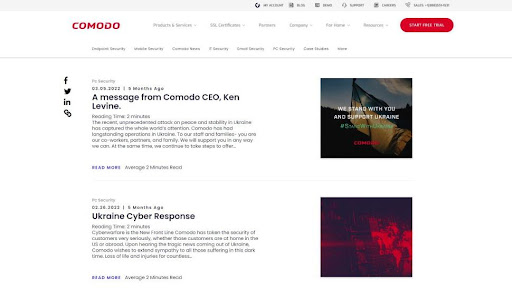
Plans and pricing
There are a couple of tiers for CDS’ cloud-based security service and one of them is completely free of charge, both for individuals and enterprises alike. Freemium editions are labeled as “Gold” while premium ones are named “Platinum” and come with plenty of additional features.
However, to get the pricing you’ll have to request a one-on-one demo and you can do so by finding the form on the main page, filling it with some personal information (full name, company name and description, number of endpoints, and so on), and submitting all of it – and the same rule applies to all of their products and services, which is a shame since we prefer a more transparent approach to pricing.
Comodo supports two types of payments including all major credit cards and purchase orders.
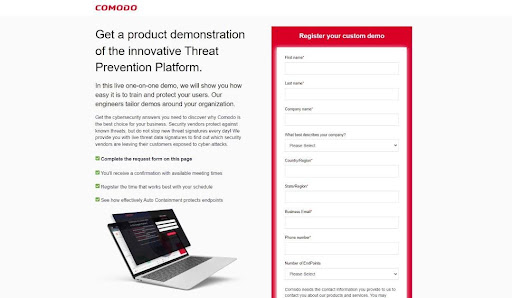
Features and functionality
CDS’ main function is to serve as the first line of defense against a whole variety of web-borne threats and it fulfills that function by blocking suspicious sites through multi-language web filtering, advanced reporting, and analytics. This comprehensive DNS-based security can cover networks of all sizes.
This solution will go through all your inbound and outbound web traffic and scan it thoroughly to make sure you’re protected in real-time against the most recent threats including malware, botnets, and risky sites – and it works for all networked, roaming, and mobile devices.
CDS’ website category database covers over 100 endpoints for filtering and provides a granular policy manager which makes it extremely easy to set up a custom, location-specific filtering policy. This site database is ever expanding and keeping up with newborn threats to make sure you’re protected at all times.
Plus, you can choose between blacklists and whitelists, depending on how strict you want the web filter to be.
Thanks to advanced reporting you can keep an eye on all events on the CDS perimeter and these reports dive into details of web activities on your enrolled networks and endpoints. To simplify things even further, CDS has split these reports into four categories including “Web Activity”, “Security”, “Mobile Activity” and “Site Activity”.
We should also note that if you’re using a freemium edition, the DNS requests are limited to 300,000 per month for each account. With premium packages the number of requests you can make is unlimited.
Also, if you don’t go for a paid plan you’ll miss out on features such as monitoring of internal IPs, creating internal IP subnet, IP block and site-based policies, encryption of all DNS traffic, an ability to bypass DNS server, and more.
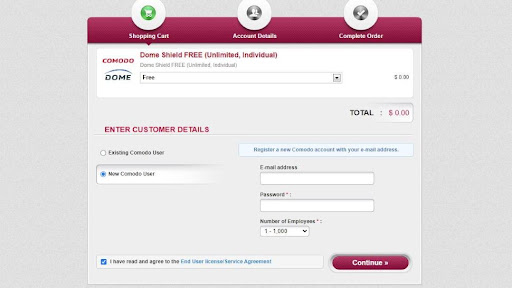
Interface and ease of use
To sign up, choose one of the three “Unlimited Free User '' packages offered on CDS’ official site – for individuals, enterprises, or managed service providers (MSPs) – and hit that button.
It’ll take you to a second screen where you’ll be asked to leave your e-mail address and come up with a strong password. After this, you’ll proceed to the confirmation page and wait a little bit for your account activation e-mail to arrive. Plus, you’ll get detailed instructions explaining each step of the way – so, even if CDS isn’t the most user-friendly solution out there, at least it comes with some superb how-tos, and Setup Wizard should come in handy as well.
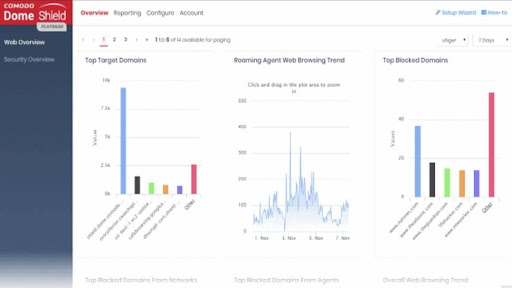
CDS’ dashboard looks a bit behind the times, but in terms of ease of use it doesn’t seem to be lacking anything – it’s intuitive and will supply you with real-time information about all the protected devices, even when they’re off your network.
Unfortunately, it seems that “Individual” packages are not available at this time, while all existing individual packages have been upgraded to enterprise type.
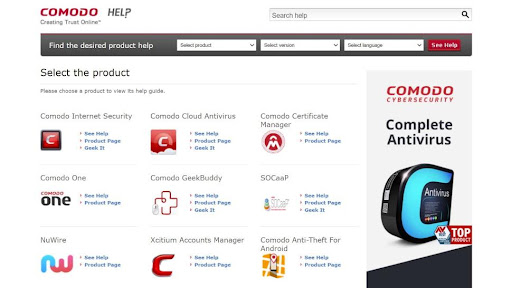
Customer support
Searching for support on CDS’ site will get you nowhere, so hit the “Learn More” button and it will redirect you to Comodo’s main site where you’ll find a couple of options. If you wish to talk with a support agent, you’ll have to settle for an e-mail address or a support ticket.
If you don’t mind digging up a solution on your own, Comodo’s knowledgebase should give you some material to work with. However, if you’re interested in CDS solutions, in particular, the best sources of information you can get are “Comodo Dome Shield Quick Start Guide“ and “Comodo Dome Shield Administrator Guide”, both of which can be downloaded as PDFs.
Also, there are about 30 tutorials on their YouTube channel, and they go into full detail on how to configure and use CDS.
Competition
While both Cold Turkey and CDS share a beginner-friendly approach, Cold Turkey is simpler to set up, use, and understand. Also, if you’re planning to upgrade your freemium edition, with Cold Turkey you can do it for pretty much peanuts – thanks to their “pay once - own forever” policy. On the other side, if you’re looking for an enterprise-level solution, Cold Turkey probably won’t fit the bill.
BlockSite is another free web filter and it comes in form of a browser extension for Chrome and Firefox and an app for Android and iOS – also, it does precisely what it promises – it blocks sites for you. While BlockSite doesn’t offer all the bells and whistles CDS does, if you're an individual user or working with a small team – it’s completely free, so check it out.
SafeDNS is another cloud-based web filtering alternative to CDS and one that offers an intuitive, modern user interface, tons of features (including access control, advanced analytics, and web usage monitoring), and pretty cost-effective pricing. However, there’s no encryption with SafeDNS, so you’ll probably be in safer hands with CDS and other Comodo solutions.
Final verdict
If a DNS-based web filtering solution is what you’re searching for, you should definitely check out Comodo Dome Shield before making a decisive decision. While there’s a bit of a learning curve, it can be easily overcome with Comodo’s intuitive, simple-to-use interface and well-written step-by-step guides.
0 comments:
Post a Comment